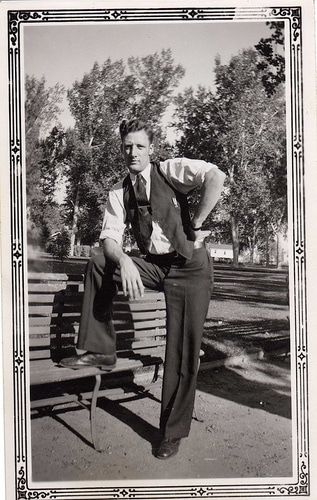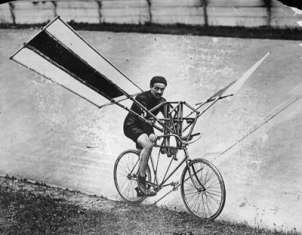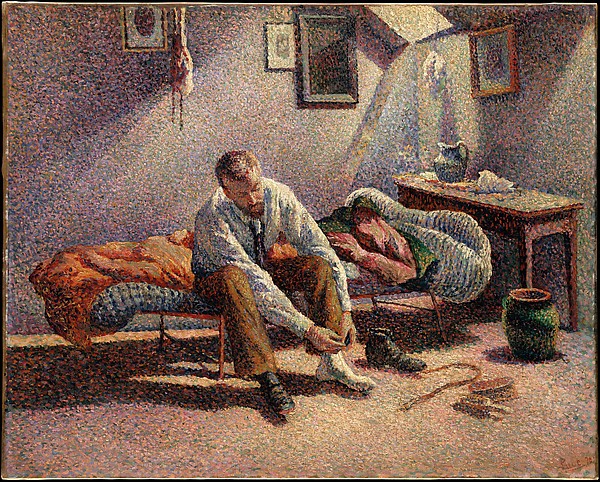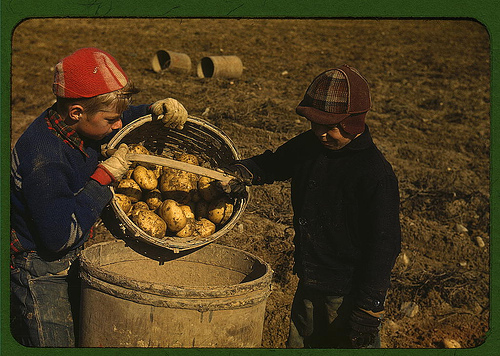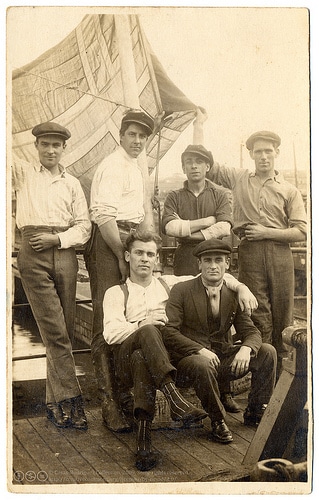
What qualities and attributes constitute true manliness? It’s a hard question to answer. You know it when you see it, but it’s difficult to put a concept as big and varied as manliness into words, even for a guy who runs a blog on the topic. So I often like to peruse old books on the subject for insights on this question. Our forebearers were just as interested in the subject as we are, but they spent more time thinking about it. Thus, the wordsmiths of the past can often really nail it on the head. One of these men who effectively got to the heart of manliness was John Brookes, who 1875 authored a book aptly named Manliness. In the following excerpts, he discusses what he believes to be the defining characteristics of manliness. Next week, I’ll post Part 2, in which he discusses the results of living these virtues. For another excellent take on what constitutes true manliness, see here.
Chapter I: What Is Manliness?
The word man in its best sense means a male adult, having the sense of strength, vigor, magnanimity. The best qualities of a man—such as dignity, valor, purity, fidelity, cheerfulness — constitute manliness.
The Romans had a word which had the same meaning to them as our word manliness has to us —the word was virtus, derived from vir, a man of courage and principle, one who deserved the name of man—the signification of which was manliness, manhood, strength, courage, capacity, excellence, virtue. Virtus included in its meaning all that was excellent in the physical, intellectual and moral constitution of man.
Hence, we can now answer the question — “What is Manliness?” Openness and bravery. Carrying out heroically our convictions of what ought to be said and done with rectitude of spirit, is manliness. . .
That great, clever man, Thackeray, has admirably summed up the characteristics of a true gentleman in a few terse queries. “What is it to be a gentleman? Is it to be honest, to be gentle, to be generous, to be brave, to be wise, and, possessing all these qualities, to exercise them in the most graceful outward manner? Ought a gentleman to be a loyal son, a true husband, an honest father? Ought his life to be decent, his bills to be paid, his tastes to be high and elegant, his aims in life to be noble?” To these searching, sensible queries, there can be given but one answer and that in the affirmative.
Not every one can tell gilt from gold, the true from the false, a gentleman from a polished villain; and yet it is reality, honesty alone, that is entitled to respect—true manliness, not its gilded counterfeit. There is much instruction in a story told of Cogia Effendi, the Persian sage. Cogia Effendi, dressed as a poor man, entered a house at feast time. He was pushed about, and hustled, could not get near the table, and was treated with such disrespect that he withdrew. Going home, he dressed himself in gorgeous garments; on his feet he put jeweled slippers, on his back a golden robe, on his head a turban, glittering with a valuable diamond, by his side he placed a sabre, in the hilt of which were precious jewels. This student of human nature strode into the room a second time. Effendi’s altered dress wrought a wondrous change. This time the guests gave way; the host himself, hurrying up to Cogia, exclaimed—”Welcome, my lord Effendi, thrice welcome! What would your lordship please to eat?” Quaint was his lordship’s reply. Stretching out his right foot theatrically, so that his glittering slipper could be well seen, he took his golden robe in his hand, and said ironically—”Welcome, my Lord Coat, welcome, most excellent robe! What will your lordship please to eat?” And then turning to his surprised host, he continued—”For I ought to ask my coat what it will eat, since the welcome was solely to it.”
Our first object in life should be, not to be farmers, lawyers, statesmen, clergymen, merchants, soldiers, but to be men, possessing more than mere craft-knowledge—having healthful, supple, strong, graceful bodies—minds which delight in observing, reading, thinking, criticizing— and hearts which love. . .
We cannot do better, we think, than conclude this introductory chapter by quoting the stirring words of Robert Nicoll—entitled True Nobility.
I ask not for his lineage,
I ask not for his name;
If manliness be in his heart,
He noble birth may claim.
I care not though of world’s wealth
But slender be his part,
If yes you answer when I ask,
‘Hath he a true-man’s heart?’
I ask not from what land he came,
Nor where his youth was nursed;
If pure the spring, it matters not
The spot from whence it burst.
The palace or the hovelWhere first his life began,
I seek not of; but answer this—
‘Is he an honest man ?’
Chapter II: Intuition
I know of no lovelier trait in childhood or adulthood than openness of character. Every noble man admires it, every true woman loves it, and every child is delighted with it. It is the key to the hearts of all, for who does not admire the upright, the sincere, the conscientious, the cheerful, the hopeful?
Does the reader think there is not much that is comprehensive and potent in this characteristic? Let us see: a man with an open, intuitive mind and heart is intelligent; he feels and acknowledges that his education is unfinished; he ever goes on improving and becoming more God-like; he has sympathy with all other souls. . . The attitude is that of one who waits; of one who does not yet know the truth, the perfect and highest course open to man; and who, as not knowing it, surveys with the serenity of suspended force all who come professing to have the truth to impart. Such an attitude has a peculiar charm. When we know a person’s final conclusions, when he has told us all that he has to impart, we may indeed feel grateful to him, but we feel also that we know the limits of that for which we are grateful. But in the yet undeveloped germ there lies an infinite possibility. There is no saying to what height such a germ may grow, in what directions or forms it may unfold itself; and an eager curiosity gathers around this first working, which cannot attend on the perfectly developed plant. This is the beauty of childhood; but it is a beauty which belongs to all those who, though past childhood, yet know and feel that they are in a state of growth and not of completion.
Depth of feeling is also necessary to greatness, nobility, manliness. . . Much of Tennyson’s power consists in his openness of heart and his depth of feeling.
That touching poem, In Memoriam, written by the Poet in consequence of the death of his friend, Arthur H. Hallam, proves this assertion. “In Memoriam” shews the gentle and manly affection which existed between the two friends. Blessed is the Damon who has his Pythias, the David who has his Jonathan, the Tennyson who has his Hallam.
Hence, depth of feeling a true man must have; it is equally necessary to have the openness of what Shakspeare calls “the mind’s eye.” Openness assists any one to get at the truth, to acknowledge his error, when wrong, and to do better in times to come. Openness gives a man largeness of view, sympathy, wholeness of heart, fervency of spirit.
Every wise man keeps his mind and his heart open to the reception of truth, new thoughts and fresh loves; to close them marks a Liliputian intellect and heart.
We are reminded of the man who stated to Sir Charles Lyell that geology was false, and that he didn’t believe one word of it. “Do you,” inquired Sir Charles, “know anything about geology? Have you ever read anything on the subject, or studied it practically?” “Not at all,” said the objector;” Why should I study it, when I don’t believe in it?” ” Well, then,” replied the geologist, “you are incompetent to discuss the subject, or to have an opinion on it. Go and study geology, and then come to me, and I’ll listen to your objections. It will, however, be needless then, for you will be of the same opinion that I am.”
How amusing the consternation amongst little souls and small minds, when a man of openness, courage and brain, makes his appearance !
In Thoughts on Government, by Mr. Arthur Helps, is this admirable sentence—” For a statesman, nothing is more requisite than that he should be able to narrate accurately, to explain succinctly, to answer clearly and logically, and in short to deliver all that he knows, or has to say, with the greatest force, the least apparent effort, and the least irrelevancy.” Herein is the whole duty of man as regards his communications with his fellow man. Let a man reason logically, accurately, succinctly, forcibly, and without irrelevancy, and one happy result will be this—unreasonable arguments will become things of the past.
Chapter III: On the Second Great Element of Manliness-Fearless and Cheerful Decisiveness
There are many persons who see what they ought to do; there are many who possess executive power; but the number of those who possess both these elements of a noble character is certainly not legion. Generally, great intuitive power is accompanied by great courage; therefore, he who lacks this power, is probably wanting in true courage…
It is unmanly to be doubtful, timorous, uncertain —to be victims of irresolution. Doubtless, much of our wretchedness arises from our weak wills. “You can only halfvfill,” said one to people who failed. He who is discontented, lacks self- reliance; he is unmanned by infirmity of will. A vacillator never can realize greatness in anything; his impulses and his time are wasted in hesitancy. He who has not decisiveness of character, proclaims himself a tool of circumstances.
A man of decisiveness is a powerful man, and if he is wisely decisive, he is a thoughtful man, is respected, is useful, and is his own master. To a man who has great force of will, and who says, “I am resolv’d for death or dignity,” the casualties of this life bow, because he will not bow to them. As Martin Tupper says—
“The iron will of one stout heart shall make a thousand quail.”
How efficiently a decisive man clears the way— makes room for himself! When he has any work to do, he says with Mrs. Page—”Come to the forge with it then; shape it; I would not have things cool.” Up and be doing—use to-day’s wind and tide. “Add a step to it,” said a Spartan to his son, who was complaining that his sword was too short. Napoleon said—”Every moment lost gives an opportunity for misfortune.”
Courage, noble stoutness of heart, is a prominent characteristic of a great soul, who is
“Ever prompt to shew
His manly forehead to the fiercest foe.”
There can be no manliness, no greatness of heart, without heroism. One thing needful for every man is that he be brave, that he place under his feet cowardice, which is an accursed thing. The good old Latin proverb contains encouragement—Fortuna favet fortibus . . .
The quaint old Fuller thus speaks of Sir Francis Drake, and his words describe a gentleman— “Chaste in his life, just in his dealings, true of his word; merciful to those that were under him, and hating nothing so much as idleness.”
Great men awake the heroic which is in their hearts; they shew that “Virtue is bold, and goodness never fearful.”
Let us up, then, and be doing whatever work we find laid out for us. As Goethe says—
“Rest not! Life is sweeping by,
Do and dare before you die!”
Who does not admire the erect, noble bearing, the calmness and invincible energy of great men —of gentlemen in thought, speech and act? Who can help admiring their freedom of thought and of heart, their daring and dignified courage, and their generous, manly pathos—a pathos which never degenerates into sickly sentimentality? Witness their high sense of honour, their determination never to take a mean advantage, their noble aspirations, and their love for all men, which – “Opens in our heart a little heaven.”
Any man who would make life a festival, must have both will and courage. We know that if we fearlessly grasp a nettle, it is harmless; touch it timorously, and it stings.
A brave man has contempt for many compliments, satellites, cushions and easy-chairs. The lives of all the great are natural, poetic, beautifully simple, heroically virtuous and harmonious. The magnanimous care little for the small things of this mortal life, and must smile at the person who is made happy or miserable by a little praise or blame.
“Hardly for the flower of men will love alone do,” says T. Carlyle. True. We need the discipline of rough circumstances to bring out the gold of our characters.
Opposition or any buffeting to which a man does not succumb, is a benefactor in disguise. We have read that migratory birds, which in their journeying keep high in the air, require a wind which is against them, in order that they may make progress and keep their elevation. So a magnanimous man in his attempts to get heavenward, requires trials, tribulations, to develop his manhood. Storms will do us no harm, if we encounter them valiantly. Great, good souls have the fewest fears; indeed, we all should have but one fear, the fear of doing wrong.
Tags: Manvotionals

